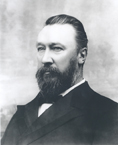 |
Member for Hume (New South Wales) 1901-1913 |
|
William Lyne was born in Great Swan Port, Van Diemen’s Land (Tasmania). Lyne ran sheep stations in Queensland and New South Wales before being elected to the New South Wales Legislative Assembly for the seat of Hume in 1880 on a platform which advocated reform of the Land Acts. He was Secretary for Public Works 1891-94 and Premier and Colonial Treasurer 1899-1901. He was knighted in 1900.
Lyne was a delegate for New South Wales to the Australasian Federal Convention 1897-98 and served on the Finance Committee. He was opposed to the Constitution Bill on the grounds that New South Wales would be disadvantaged and he campaigned against the Bill at the referendums in 1898 and 1899.
As Premier of New South Wales, Lyne was invited by the Governor-General to form the first Commonwealth Government in December 1900. Unable to gain support, Lyne was forced to stand aside and on 1 January 1901 Edmund Barton was sworn in as Australia’s first Prime Minister in his stead. Lyne joined the Barton ministry as Minister for Home Affairs.
Lyne, a committed Protectionist, was elected to the House of Representatives for the seat of Hume in the first federal election in March 1901. In the first Parliament he had responsibility for the carriage of the Commonwealth Electoral Bill and the establishment of the Commonwealth Public Service, and as Treasurer 1907-08 he presented a budget which set the pattern of financial arrangements in Australia for many years.
Alienated from the Deakin Government after 1909, Lyne was elected in 1910 as a pro-Labor Independent. Ill health prevented him from campaigning during the 1913 election and he was narrowly defeated. He died soon afterwards.
previous | list of members | next
|


